Homelessness: The Northampton man feeding people on the streets
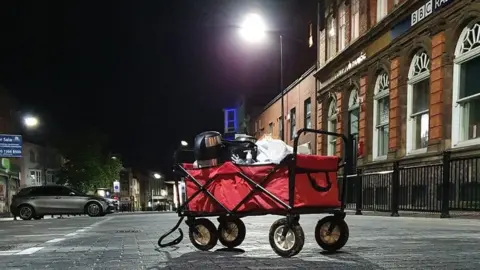 Stan Robertson
Stan RobertsonEvery morning, whatever the weather, one man delivers hot breakfasts to a town's rough sleepers. What drives his mission, what do the people he feeds think - and why is he a controversial figure?
It is shortly after 06:00 BST on a cold morning as Stan Robertson walks down Northampton's main Abington Street thoroughfare, pulling a trolley laden with hot food and drink.
He is delivering breakfast to rough sleepers, a daily trip he began making three years ago.
Stan feels compelled to help because he was once one of them.
"Rough sleeping was very personal, because I had been there," he says.
"I understand addiction. I've been through that whole cycle."
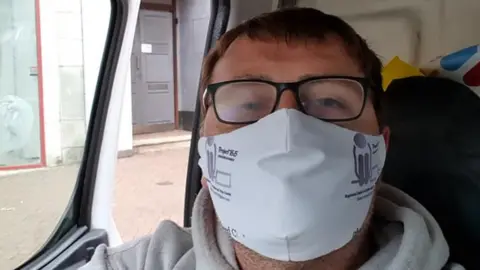 Project 16:15
Project 16:15Running away from home for the first time aged nine, he spent much of his youth in care. Later came borstal and prison.
The streets were never far away and nor were violence, alcohol and drugs. "I was a wreck," he admits.
That was until a remarkable change in his life.
Now 53, Stan is a street pastor in Northampton and runs charity Project 16:15.
It takes its name from a verse in the Gospel of Mark, which reads: "Go into all the world and preach the gospel to all creation."
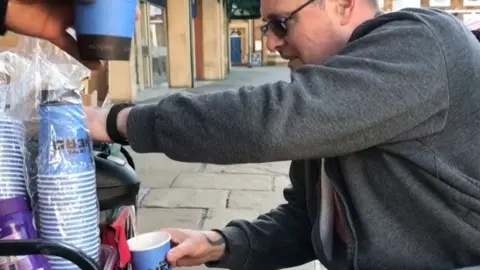
Walking on, he spots three men in sleeping bags, sheltering under the Guildhall.
They all know Stan and greet his arrival - and the hot food and tea he brings - with smiles.
Stan has "a big heart", one says.
"When I first met him it was a Sunday and other services weren't available. I was starving and malnourished. He's a lifesaver."
Even as he prepares to leave, there is one more person to help.
A woman approaches to say hello. She is now in temporary accommodation, but Stan's food trolley was once a lifeline for her.
Life on the streets was "horrible", she says. "I was spat at. It was cold."
She had no access to incontinence pads. "Stan was the only one to help."
She tells him her food has been stolen from her new flat. He offers to take her a food package.
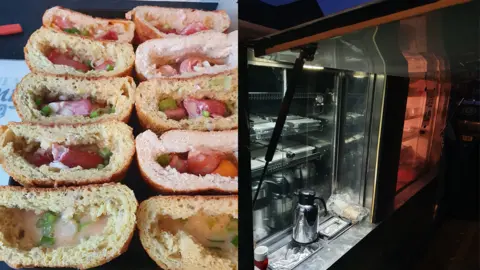 Project 16:15
Project 16:15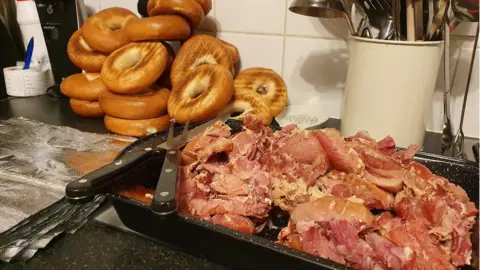 Project 16:15
Project 16:15Stan says his idea to deliver breakfast came when his wife told him "the one thing that makes her feel really valued" is when he takes her a morning cup of tea.
"That gave her a sense of worth, so I transferred that theory to a bigger scale."
A fully-fitted food van accompanies his trolley, and there are plans for an outreach vehicle hosting a mobile food bank and mental health clinic.
His charity also puts on mindfulness sessions and last year started a football team for rough sleepers.
Before the Covid-19 pandemic hit, self-defence classes were planned.
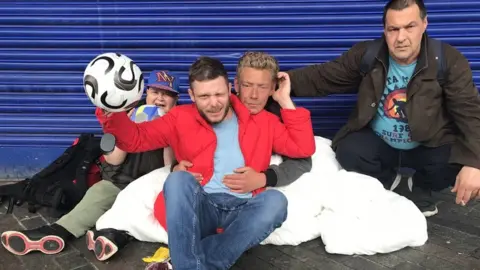
Stan says the project is based on his belief that everyone has equal value.
"The guy sleeping over there has the same worth and humanity as I have; as the head of the Bank of England has," he says.
Stan says his own time on the streets began when he ran away to escape abuse.
Walking from his home in St Albans to London, he spent a fortnight "scavenging out of bins, grabbing what I could".
Eventually the police were called and he was returned home.
In and out of care, Stan remembers spending time in "a padded room in a secure unit" and being beaten up by care home staff.
Stan, who is autistic, says he and others were "just classed as naughty kids".
The care system "didn't care", and he spent more and more time living in squats and on the streets.
"It led to more violence: to drugs, to drink. I took anything you could get your hands on.
"One of my vague memories - I must have been about 13 - was the paramedics coming to me because I had stopped breathing and died on the street with a glue bag on my head."
You might also be interested in:
By adulthood, he was on the path to self-destruction.
Redemption came 23 years ago when, he says, a police officer, instead of arresting him, took him to church.
"People were looking. My appearance wasn't exactly Christian. I had a coloured Mohican and piercings, and was wearing bike leathers. I probably didn't smell too good."
Suddenly an elderly woman took his hand.
"She looked at me and said, 'Jesus loves you. You are worth more than this.'"
The preacher then spoke to Stan.
"He said 'Today you've got the choice. You either realise your value, that it is worth more than where you are at, or you continue on this path of destruction.'
"That's the moment that changed my life."
Stan has not touched drugs since, he says, and has applied the preacher's words to his own charitable work.
"It dawned on me there was nobody demonstrating at street level that people are worth more."
'You are the only nice person in their lives sometimes'
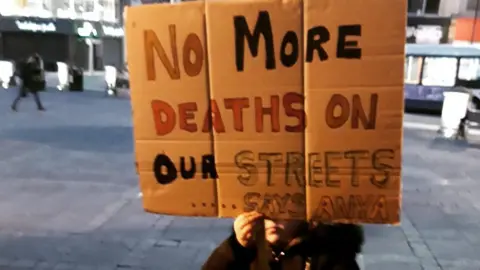 Project 16:15
Project 16:15Emma Lynham, a long-term supporter, gives out food and provides pastoral care, particularly to female rough sleepers.
"When they are in dire straits or crying we try to get them a hotel room for the night, or get them new clothes," she says.
"You are the only nice person in their lives sometimes.
"Stan is just dedicated. It is the behind-the-scenes stuff - when someone is upset at 10:30 at night, or he does hospital visits.
"It makes a difference."
'I won't be going back on the streets'
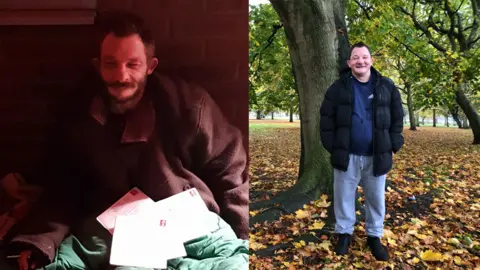 Project 16:15 / BBC
Project 16:15 / BBCAfter two "very difficult" spells on the street, David Horne now has his own flat.
"I was getting picked on, being threatened," he says.
"People were attacking me at night. Stan used to watch to make sure I was safe."
Project 16:15 delivered birthday cards to David, and when he had an ulcerated eye Stan persuaded him to go to hospital.
"I don't think I'd be here if it wasn't for Stan," he says.
"I couldn't go back on the streets. I won't be going back."
'You are reminded of the people we've lost over the years'
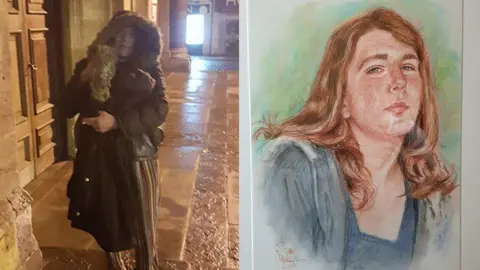 Project 16:15
Project 16:15Stan remembers the first meal he served on the streets.
"That was Sam Wright. She asked me if I could bring her salmon bagels. That was her favourite."
Sam died in May last year, aged 42.
Project 16:15 organised her memorial and Stan commissioned a portrait of her. "That picture hangs in pride of place at her parents' house," he says.
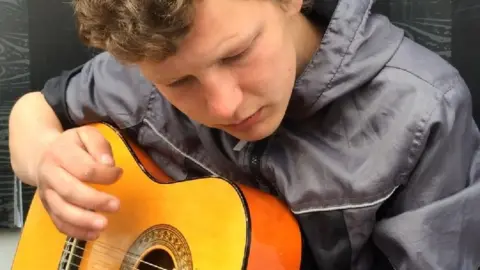
Lithuanian musician Kristian Olsteins came to Northampton with high hopes, but ended up sleeping on the streets, hugging a giant teddy bear.
He died last February, aged 22.
Project 16:15 organised for his body's repatriation.
"When you do the walkabout, you are reminded of the places where people are no longer there, people we've lost over the last three years," Stan says.
"That's the real humanity of the streets. That's what drives me."
Killing with kindness?
Stan's time in Northampton has not been without controversy.
In 2018, he criticised the borough council's homelessness strategy, which said sleeping rough was a "lifestyle choice" and that those giving food or money to people on the streets were killing with kindness.
Stan said the council was "killing with ignorance".
In a 2018 report, Project 16:15 was accused of "using misinformation to undermine" the council's work with the homeless and of "sustaining rough sleeping".
When discussions started to heal the rift between the council and charitable organisations, Project 16:15 had a seat at a table.
A new homelessness forum was set-up, but Stan was not part of it.
He says he was pushed aside. Others say he walked away.
'He was my moral support'
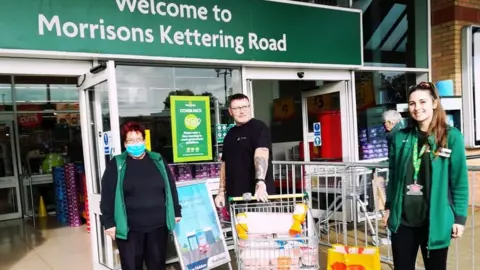 Project 16:15
Project 16:15Jenny spent seven years "on and off" sleeping rough. She now has a council flat but still gets support from Project 16:15.
"Stan brought food round this morning. I'd asked him about a food bank, but instead he brought hot food," she says.
When she was homeless, Stan gave her the "get up and go" she needed.
"I was a crackhead and a drinker. I haven't had crack for two years now. I'm very proud of myself," she says.
"If it wasn't for Stan I wouldn't be where I am now. He was my moral support."

Find BBC News: East of England on Facebook, Instagram and Twitter. If you have a story suggestion email [email protected]
